En grundläggande skillnad mellan 1900-talets industrisamhälle och nätverkssamhället vi nu lever i är allmänhetens tillgång till data och information. I datavärlden har man länge arbetat öppet, till exempel med operativsystemet Linux. På energiområdet har behoven av öppna standarder varit litet eftersom systemen varit så gigantiska, med nationella elnät och jättelika kraftstationer. Samarbeten har skett mellan stora företag och myndigheter, inte mellan hushåll, kvarter och transportmedel. Fri energi innebär en fundamental förändring av energisystemen, från centraliserade, hierarkiska strukturer till småskaliga, distribuerade nätverk. I och med solenergins och batterilagringens snabba etablering har behovet av, och tillgången till, data ökat lavinartat. För att framtidens energiverktyg ska fungera tillsammans krävs en gemensam referensram. The Battery Data Genome syftar till att dela batteridata på ett standardiserat sätt så att batteriutvecklare kan tala samma språk.
The primary roadblock to a battery-data-science renaissance is the requirement for large amounts of high-quality data, which are not available in the current fragmented ecosystem. Here, we identify gaps and propose principles that enable the solution by building a robust community of data hubs with standardized practices and flexible sharing options that will seed advanced tools spanning innovation to deployment.
Joule: Principles of the Battery Data Genome (pdf)
The authors are committed to continue advancing the Battery Data Genome by expanding and linking the existing data hubs and by building the community and organizational structure needed for success.
Joule: Principles of the Battery Data Genome (pdf)
Denna satsning är både nödvändig och väldigt positiv. Precis som datorer är energiverktyg av avgörande betydelse för vårt samhälles framtid. Vi kan skapa strukturer och system som främjar samarbete, mellan hushåll, områden, företag, organisationer, kommuner, länder, världsdelar. Med en gemensam grund för energisamarbete kan människor världen över nyttja och bidra till energisamhällets utveckling.
På Grow tog vi ett litet första steg i denna riktning när innehållet på growsverige.se licensierades för remixer och återbruk 😉
There are many ways to map the world, from geographic illustrations to the genetic makeup of the organisms around us. As an avid outdoorsman, hiker, and mountain biker, it is natural that National Renewable Energy Laboratory (NREL) Scientist Kandler Smith would also apply these concepts to his research. Smith leads NREL’s battery computational modeling for electrochemical energy storage, where he designs maps and models to improve our understanding of batteries.
CleanTechnica: Mapping the Battery Data Genome for Better Batteries
The Battery Data Genome will collect information from every part of the battery life cycle, including basic data like how batteries respond to different types of charging and discharging, and additional variables like the effects of temperature, driving speed and differences in the materials within the batteries.
CleanTechnica: Mapping the Battery Data Genome for Better Batteries

CleanTechnica: Mapping the Battery Data Genome for Better Batteries
Inside Climate News: How a New ‘Battery Data Genome’ Project Will Use Vast Amounts of Information to Build Better EVs





